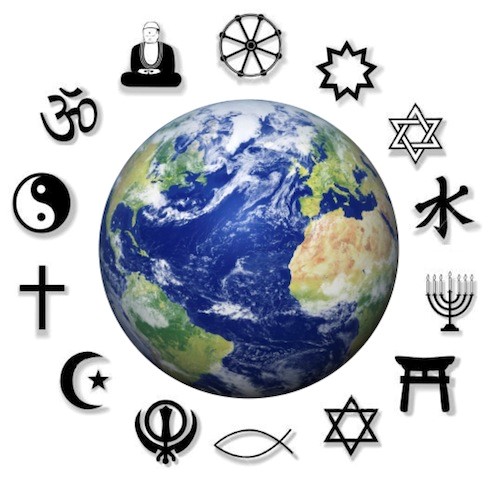Many religions are promoting the belief that the world will soon come to an end, in which case they will undoubtedly embrace an ethos of “let it burn”: what does it matter if the rainforest is cut down if next week is the Rapture? But you might just as plausibly point out that many religions are big on compassion, and some, including Judaism, also ban the killing of animals. This should push their members to care about the natural environment.
Throughout human history, the belief in a supernatural being has been part of our lives. It has shaped our way of life and has played a critical role in human civilisation.
The environment has been part of our civilisation. From the time of hunting and gathering till the present massive globalisation and industrialisation. Nature is a composition of man and the environment and the interaction between them is very key for the survival of both.
When God created the world and man, He made man to take dominion of the earth and to make use of nature which comes as a blessing from the Almighty to mankind.
Indeed, the universe is full of diverse creatures that aim to fulfill man’s needs and prove God’s greatness. To this end, the Quran reveals clearly in Surah Al-Nour (The Light, 24:41) “Have you not seen that God is glorified by all in the heavens and on earth, such as birds with wings outspread? Each knows its worship and glorification, and God is aware of what they do.”
Additionally, in Surah Al Muminoon (The Believers, verses 17-20) “And we have created over you seven layered heavens and never have We been unaware of Our creation. And We have sent down rain from the sky in a measured amount and we cause it to settle on earth, And indeed We are able to take it away, And We brought forth for you thereby gardens of palm trees and grapevines in which for you are abundant fruits and from which you eat; And We brought forth a tree issuing from Mount Sinai which produces oil and food for those who eat; And indeed, for you in livestock is a lesson. We give you a drink from that which is in their bellies, and for you in them are numerous benefits, and from them, you eat.”
This points to the fact that nature was meant for the benefit of man, to use it to satisfy his need and sustain his survival.
The two most dominant religions Islam and Christianity share the same Abrahamic religious roots which humans are created by the single omnipotent God who has given them everything that they need (Kula, 2001). Other religions such the Buddhism and traditional African religion also share a common belief that man is part of nature and that the sacredness of nature must be preserved. It is not surprising that these two religions (Buddhism and Traditional African religion) as part of their environmental nature, keep certain forests, rivers, plants, and animals sacred and must be protected at all times.

However, of all the debate surrounding religion and environmental conversation, Islam is late to the party as Christianity has received most of the backlash due to its historical environmental exploitation and the role of the church in this endeavour. Perhaps one of the prominent critics of Christianity is Lynn White. One of his key criticisms was that Christian doctrine separated humankind from nature and directed him to a position of supremacy over nature (White,1967). This according to Kula (2001) has enabled humanity to follow a ruthlessly successful strategy of extraction of natural resources that has led to environmental problems with the aid of the scientific and technological revolutions that have taken place over the last few decades. The victory of Christianity over paganism, which considered humans to be part of nature, was another aspect that intensified exploitative zeal.
Christianity and The Environment
In 1967, historian Lynn White wrote in the high-profile journal Science that Christian religions threaten wildlife protection by promoting an ideology of superiority over nature. Since the Bible speaks of “dominion” over nature, White argued that Christianity teaches its adherents that “it is the will of God for man to use nature for his proper purposes” (White, 1967).
This was controversial, to say the least. Some scholars and theologians have argued that the Bible was misread by White (1967) and that the text simply means that we have a duty of care for nature. More to the point, perhaps, White gave no proof of the actions or activities of real Christians (Rust, 2017).
In 2013, by asking if there was a connection between the main religion of a country and the number of significant areas of biodiversity it contained, Mikusiński, Possingham, & Blicharska (2014), found that Christian countries tended to have more areas set aside for nature than other countries, particularly Catholic ones. This does not, however, indicate that White was absolutely incorrect. Other research suggests that conservative Christians are generally less eco-friendly than other religions.
Andrew Greeley (1993), a priest and sociologist, in his study “Religion and Attitudes toward the Environment”, looked at how much Americans were willing to spend on environmental protection. He noticed that Christian fundamentalists were less likely to support the world financially, and Catholics were more willing. This indicates that what determines their actions towards nature is not whether a person is Christian, but rather what kind of Christian they are.
Similarly, Shepheard-Walwyn (2014) researched on how Kenyans felt about holy sites in her Ph.D. thesis, during her studies at the University of Kent in Canterbury, UK. These holy sites are places of biological and spiritual significance, created by societies that adhered to traditional faith and preserved them. Shepheard-Walwyn’s work discovered that “some of the respondent Christians thought that the woods should be destroyed because they are akin with the traditional religion that they think is bad”. One of the interviewees in his response said that” tradition is witchcraft now” (Shepheard-Walwyn, 2014). The sacred sites were identified by others as places connected with demons and superstition (Rust 2017).
Additionally, Leela Hazzah (2007) found in his study published in 2006 that Maasai who had converted from traditional faith to become evangelical Christians had a greater intention of killing lions than those who maintained their traditional faith. He emphasized this by saying that “These converted Protestants did not have very positive attitudes towards national parks or wildlife either”. The Maasai are known for not being exposed to a lot of television or other media, hence their source of information about the world are their pastors or preachers. In their sermons, if a preacher does not have optimistic stories about nature, the churchgoers would not get any advice about how to be environmentally friendly (Hazzah, 2014).
It also seems that people’s attitudes towards the environment can be affected by the way Christianity interacts with other religions. This suggests that conflicts between opposing faiths could influence how people feel about protected areas. In particular, a shift away from more traditional faiths could be bad for nature (Rust, 2017).
Islam’s Position on Environment
Islam is one of the largest religions in the world. It shares the same ancestry history root with Christianity, the Abrahamic religion. Islam commands influence on about 20 percent of humanity covering a very large territory especially in Africa, Europe/Middle East, and Asia. Unfortunately, some of the greatest environmental problems have occurred in Muslim countries (Kula, 2014).
Islam has been found to be (if not the most environmentally conscious) one of the most environmentally friendly religions. The concept of human living on earth is based on stewardship and benefaction. To this end, Arafa (2014) emphasized that Islamically man’s role in the world is based on two principles: stewardship of man, which means that man is not only a person, but also God’s khalifa (the steward) on earth; God is the sole owner of the earth, and man is a mere beneficiary, and man can use nature for the benefit of his or her and other creatures without depleting it, and the principle of trust that all the natural resources of God are created by God.
Most of the works about Islamic environmentalism are primarily targeting Western environmental exploitation, economic policies and rarely address the issues of the environment. Indeed Erdur (1997) posited that a closer analysis shows the peculiar nature of Islamist concern about environmental problems, which is distinct from both the predominantly pragmatic, problem-oriented public climate and the radical Western environmental movement, which is basically a cultural self-criticism directed at the current conception of man’s nature relationship. To state it correctly, the Islamist environmental concern is often more related to the West than to the environment itself.
The Quran (divine book of Islam from God) and Hadith (The sayings, teaching, and life of the prophet of Islam) which are the primary and secondary sources of religious texts respectively for the Muslims have several verses and reports which further emphasizes how Islam strictly encourages environmental conservation and protection. The Quran states in Surah An-Nahl (The Chapter of the Bee verses 10-15) “It is He who has sent down rain from the sky: from it is drink and from it is foliage in which you pasture animals. He causes to grow for you thereby crops, olives, palm trees, grapevines, and from all the fruits. Indeed, in that is a sign for a people who give thought. And He has subjected the sea for you to eat from its tender meat and to extract from it ornaments which you wear. And you see the ships plowing through it, and He subjected it so that you may seek of His bounty and perhaps you will be grateful. And He has cast into the earth firmly set mountains, lest it shifts with you and made rivers and roads, that you may be guided.” These verses emphasize the need to use all that nature provides us to satisfy our needs. However, the Quran also cautions us of wastefulness and the need to be moderate in consumption. In Sural Al- Bakara (The Cow verse 60), It states “Eat and drink from the provision of God and do not commit abuse on earth or spread corruption.” Similarly, in Surah Al- A’raf (The Elevated Place verse 21) the Quran says, “Eat and drink: but do not be excess, for God loves not the wasters”. In the same chapter verse 31, the Quran says, “Children of Adam, dress well whenever you are at worship, eat and drink (as we have permitted) but do not be extravagant: God does not like extravagant people.”
In the saying and practices of the prophet, He said “If a Muslim plant a tree or sows seeds, and then a bird or a person or an animal eats from it, it is regarded as a charitable gift for him.”
Despite these clear-cut instructions of consumption in moderation concerning future needs, the pollution levels in Muslim countries provide a contrary view. Some of the biggest environmental issues have prevailed in Muslim countries. There are several examples, such as the depletion of the Aral Sea in Kazakhstan and Uzbekistan, once the world’s fourth-largest lake, but now just 10% of its original size (Kula, 2014).
Similarly, the desertification of sub-Saharan Africa (especially, Northern Nigeria, Mali, Chad, Sudan, Niger, Libya, and Somalia, which are Muslim dominated) has produced famines and displaced millions of people over the last couple of decades. In Indonesia, the almost complete degradation of natural forests, once home to one of the richest biodiversity resources in the world, has taken place due to official and illegal logging activities (Kula, 2014). Additionally, the depletion of Saudi Arabia’s groundwater resources due to large-scale desert wheat cultivation, which caused the country to become a major exporter of wheat, but at the cost of rapidly declining groundwater levels. Overexploitation of oil and gas reserves in the Middle East and the Gulf States is alarming. Contrary to this excessive consumption and exploitation, Islam, as a major world religion, frowns upon any unnecessary and dangerous environmental activity (Kula, 2014).
Conclusion
Both Islam and Christianity frown against wastefulness. But from history, Christianity has encouraged rigorous exploitation of nature for human satisfaction whiles Islam has taken a more moderate view.
Religion in principle encourages the use of nature to satisfy human needs in moderation. Humankind tends to have a different view of nature when they change their beliefs. As argued above, people who change their faith from Traditional beliefs to Christianity ascribe evilness to the forest and some animals which their former beliefs hold sacred. For instance, in Kenya religious gatherings were often conducted by the Evangelical Churches, sometimes for a week, to which pastoralists were invited. That meant that no one at the homestead was around back to protect the livestock from predators. During one such case, two pastoralists lost 35 cows. When one of the pastoralists was asked why they left their livestock unattended for so long: He replied that ” When I am in God’s house, there is no need to return home. He will protect my livestock from danger (Hazzah, 2014).
The result of seeking material advancement in a reckless and unsustainable way is global warming and the destruction of nature. Profit-driven economic development has now become the core objective of modern society, and nothing is allowed to stand in its way (Kula, 2014). The nature of humans is to satisfy their wants and needs, and in so doing makes use of nature vigorously. Economic development and wanting a better living standard to make the demand that nature is exploited to achieve this goal. To this end, humans have forgotten that our anthropogenic activities are hurting the environment and there is the need to rethink sustainability.
Religion can be a tool in achieving both economics and environmental protection. Through religious sermons, the need to protect the environment can be emphasized and preached to the faithful. An example is when the government of Qatar admonished the Imams of 150 mosques to talk about global environmental problems and the greenhouse effect of atmospheric pollution to its populace. This came after 200 countries considered the extension of the Kyoto Protocol to 2020 at a conference in Qatar.
It can prove to be a constructive path forward by using faith-based methods, which indeed can achieve far-reaching benefits rather than remain limited to a conventionally science-based approach. To downplay the environmental crisis, we are facing would be silly. But conservationists will be needed to harness the power of hope and optimism to fix it, much as the religions of the world do.
























